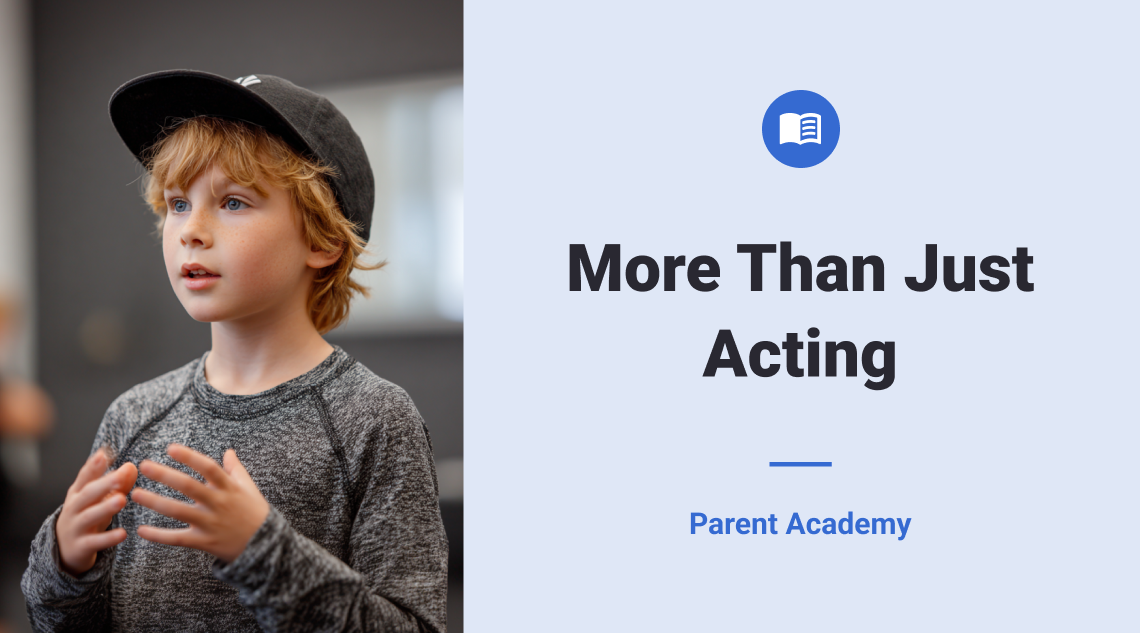
Quick Summary
Acting classes offer kids much more than performance skills—they build confidence, communication, and emotional awareness that benefit them far beyond the stage. Here’s how:
- Boosts Confidence Through Performance
Acting classes help kids overcome stage fright by practicing in front of supportive peers and learning to trust their abilities. - Improves Verbal and Non-Verbal Communication
Young performers gain clarity in speech, voice control, body language, and public speaking skills useful in daily life and academics. - Develops Emotional Intelligence
Kids explore emotions through characters and scenes, building empathy, emotional regulation, and social awareness in a safe setting. - Builds Resilience and Adaptability
Constructive feedback helps children learn how to accept critique, grow from it, and develop problem-solving skills in the process. - Encourages Creative Expression
Acting exercises let kids explore imagination, storytelling, and identity while nurturing their individuality and creative voice.
How Do Acting Classes Help Kids Build Confidence on Stage and in Life?
For the majority of children, the acting classes will be one of the very first times they are performing in front of an audience. Regardless of age, people tend to experience stage fright before such public appearances, which is completely natural. Acting classes can help with such insecurities because these stage performances will receive constructive feedback from the instructors with the aim of reaching improvement. This should eventually allow the kids to start trusting their abilities in front of an increasingly larger audience.
The opportunity to freely self-express in a safe environment with peers who have similar aspirations can also really allow a child to get their creative juices flowing to discover and showcase their various talents and ideas out in the open. Of course, not everything a kid does at the acting classes will receive biased praises, regardless of what they do - professionals will give kids the exact feedback they need to improve. As kids learn to carefully listen, adapt, and follow upon receiving feedback, they will develop the resilience necessary to overcome obstacles and setbacks to become better acting performers. Such newfound confidence in their abilities can easily translate into problem-solving skills in other areas of life as well, including achieving their goal within academic and professional settings.
What Communication Skills Do Kids Learn in Acting Classes?
As the child learns to express themselves without restrictions of anxiety and overthinking, it will improve not only their performance abilities as aspiring actors but the acting class attendance experience can also give the necessary public speaking experience to later confidently nail assignments like educational or even professional presentations, as well as simply improving their social skills in everyday life situations.
Importantly, their communication skills will improve not only through self-confidence, as acting classes teach young aspiring actors how to clearly and efficiently articulate themselves. As kids learn how to control and modulate their voices, they will speak more clearly on and off the stage, and with or without any sort of audience. Such abilities increase speakers' authority and expressiveness, which can pose many benefits in the future too.
While working on their acting skills, these classes will also teach kids to communicate non-verbally by using their body language more effectively. As children learn to use their posture, expressions, and gestures for purposeful communication, they will be able to enhance their appearance as more approachable, as well as leave an extra confident impression on others.
How Can Acting Classes Improve Emotional Intelligence in Children?
As kids delve deeper into what it takes to successfully play various characters during the acting classes, they will also try out acting exercises and techniques that focus on understanding various types of emotions better, not only from the perspective of the given roles but also their own as well.
During the acting classes, kids will observe their own emotions and the responses that they give in various scenarios. As the young aspiring actors learn to recognize their own emotions in a safe environment provided by the acting classes, they will not only develop empathy from being able to put themselves in the place of someone else but also get better at exploring and articulating their own feelings. Similarly, exploring the motivations and emotions of characters in the script can allow kid actors to better understand the behaviour of others on and off the stage as well.
Besides recognizing and understanding emotions better, kids in acting classes can also learn how to actually express them better. While learning to express a wide range of emotions convincingly is a large part of becoming an actor, it allows kids to experiment with feelings such as anger, joy, sadness, fear, and confusion. While at the classes they will do it for stage performance purposes, it also indirectly teaches kids how to respond to various situations later in life in a thoughtful way. Ultimately, they will not only improve as performers but also be able to shape and manage their social interactions and relationships in a much healthier way going forward.
